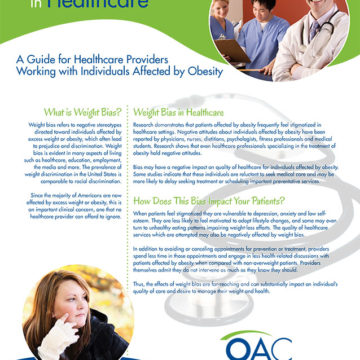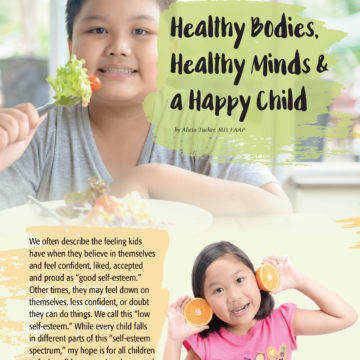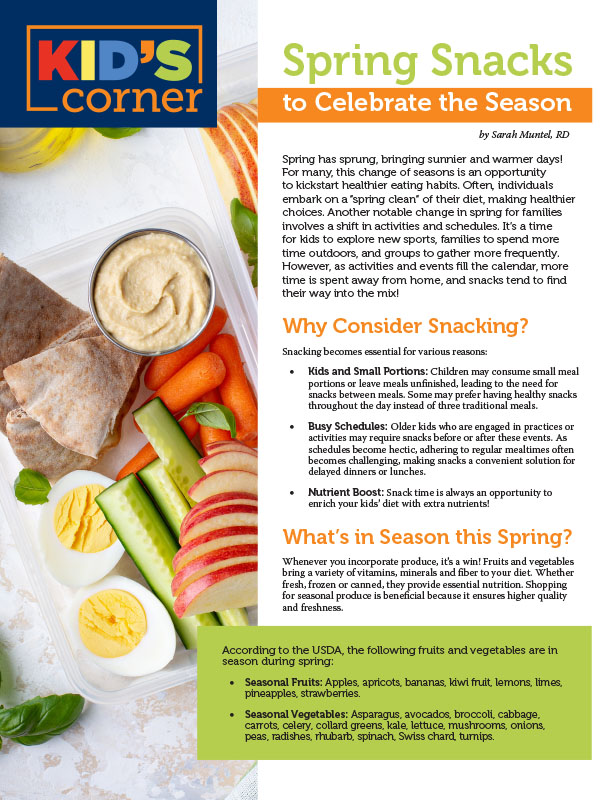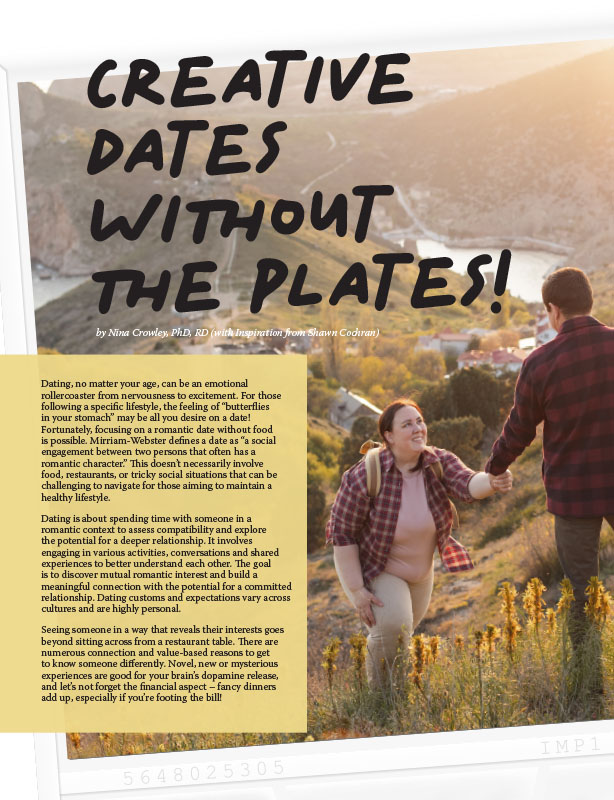OAC Community Perspectives: Embracing Empathy, Understanding, Diversity and Inclusivity

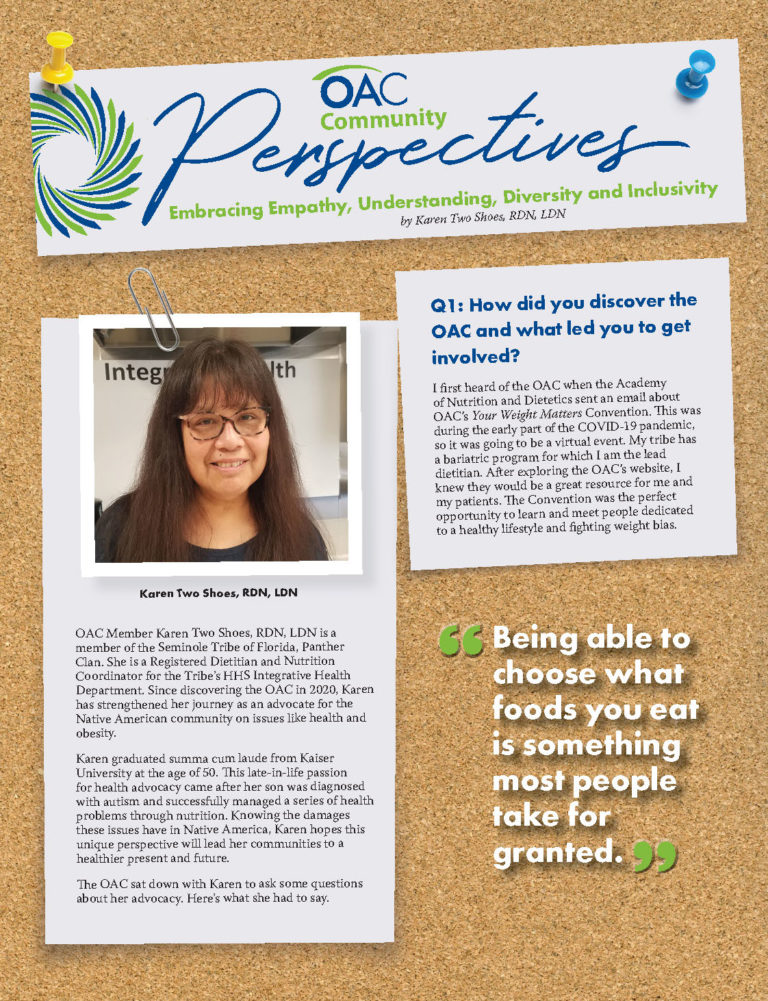
by Karen Two Shoes, RDN, LDN
Winter 2022
OAC Member Karen Two Shoes, RDN, LDN is a member of the Seminole Tribe of Florida, Panther Clan. She is a Registered Dietitian and Nutrition Coordinator for the Tribe’s HHS Integrative Health Department. Since discovering the OAC in 2020, Karen has strengthened her journey as an advocate for the Native American community on issues like health and obesity.
Karen graduated summa cum laude from Kaiser University at the age of 50. This late-in-life passion for health advocacy came after her son was diagnosed with autism and successfully managed a series of health problems through nutrition. Knowing the damages these issues have in Native America, Karen hopes this unique perspective will lead her communities to a healthier present and future.
The OAC sat down with Karen to ask some questions about her advocacy. Here’s what she had to say.
Q1: How did you discover the OAC and what led you to get involved?
I first heard of the OAC when the Academy of Nutrition and Dietetics sent an email about OAC’s Your Weight Matters Convention. This was during the early part of the COVID-19 pandemic, so it was going to be a virtual event. My tribe has a bariatric program for which I am the lead dietitian. After exploring the OAC’s website, I knew they would be a great resource for me and my patients. The Convention was the perfect opportunity to learn and meet people dedicated to a healthy lifestyle and fighting weight bias.
Q2: How has obesity affected your life and/or work?
I’ve struggled with my weight all my life. Back in the 1970s, my tribe was poor and relied on government commodity foods. Balanced nutrition was not a major concern. As a young adult, I was more concerned about my beer and burgers than my health.
In 2000, I was diagnosed with diabetes. By this time, I had obesity and I was taking a handful of pills for all kinds of health problems. I had also met my future husband and knew I wanted children. Over the next 10 years, I developed a healthier lifestyle, lost a fair amount of weight and had two children. I had gotten off most medications and had good control over my blood sugar through diet and exercise.
In the mid-2010s, I decided on a career in dietetics with a goal of bringing this knowledge back to my fellow tribal members. I still have weight management issues. I may never be the “perfect” weight and that’s okay. I am satisfied with the healthy lifestyle I’ve set for myself and my family. This is also the message that I want to send to Native America and to all people who worry or are dissatisfied with a number on a scale.
Q3: As an advocate for the Native American community, what have you learned about the connection between obesity and culture?
Food is such a personal experience influenced by culture and ethnicity. Being able to choose what foods you eat is something most people take for granted. There was a time in the not-too-distant past where food choices were taken away from native tribes. Traditional foods, like wild game and regional plant life that indigenous people thrived on, were replaced with foods provided by the government such as white flour and rice, canned meats and processed foods. The colonization of the Native American diet did not serve our people well. With generations of indigenous peoples surviving on these foods, the health of Native Americans has taken a hit, with obesity and diabetes being the main contributors. This is just one of the historical traumas indigenous peoples have had to overcome just to survive.
Today, food insecurity is still a problem on some reservations while others have the same issues most Americans have – an overabundance of unhealthy foods. However, after a fire, a new forest is reborn. Tribes across the nation are on a quest back to health with a return to pre-colonial traditional foods and community programs focusing on physical activity. I am hopeful that I can contribute to this healthful movement.
Q4: How has your work as a dietician informed your practice or changed your perspective on people with obesity?
The latest science and research on obesity has been such an eye (and mind) opener! Obesity is more than overeating and not exercising. This data affects both me and my patients.
As a dietitian, I love that I understand the medical terms and processes of the body. But as a person who struggles with her weight, I feel relief that I can let go of the outdated concepts of “eat less, move more” and “calories in, calories out.” It’s so much more than that. There is no empathy or understanding when thinking in those terms. And that’s what I can give to my patients – assurance that a number on a machine does not define you or tell you your worth. Let go of the guilt and learn how to be healthy in mind, body and spirit.
Q5: What can be done to better support Native American communities, specifically around the issue of obesity?
I call upon all of the healthcare community to embrace the meaning of these words: empathy, understanding, diversity and inclusivity. These words are for all BIPOC (Black, Indigenous, People of Color) and any other persons or groups of people who have been marginalized.
Health, science and medicine have made so many advances in just the last 10 years. You only have to look at how COVID-19 has affected various groups of people to understand that our bodies have varied reactions. Then, when you add culture, ethnicity, religion, beliefs, and experiences on top, that’s what makes us all so beautiful.
To all doctors, nurses, dietitians, therapists, scientists and social workers: stay up to date, dig into the latest research on obesity and let go of weight bias. It doesn’t serve you or your patients. I know I got into healthcare because I care for people’s health. Even though I work within my own tribe, I have joined other organizations like the OAC so I can learn and share about health to all people. It has been a rough couple of years for the healthcare workforce, but please – do not lose sight of why you came into this field. What I say next, I say as a patient: we need you, even when we act like we don’t.
Q6: What has been the most memorable part of your advocacy journey so far?
Honestly, the people I’ve met have been the most memorable to me. I really started digging into obesity research and advocacy when the pandemic started, so this means I met most of these people virtually! I have virtually attended many medical/healthcare conferences and they’ve all been very informative. But I must say, the OAC’s Your Weight Matters Convention is my favorite because I can mingle not as a dietitian, but as a person on a weight management odyssey. Talking to others who are not in the medical field is enlightening and fun, too! I also love how the OAC Community has welcomed and embraced me. Listening, learning and having a blast… a perfect trifecta! I am now looking forward to meeting everyone in person. When you see me at the next OAC Convention, make sure to say hello!
Do You Want to Share Your Story?
Whether you have a story about navigating obesity, facing weight stigma or inspiring others, your voice is important. Visit the OAC’s story project at WeightoftheWorld.com to share yours today. Not sure what to say? Consider one of our question prompts to guide you.
If you would like your story to be featured in a future issue of Weight Matters Magazine, please email membership@obesityaction.org.
by Sarah Muntel, RD Spring 2024 Spring has sprung, bringing sunnier and warmer days! For many, this…
Read Articleby Robyn Pashby, PhD Winter 2024 “No one is ever going to date you if you don’t…
Read Articleby Nina Crowley, PhD, RD (with Inspiration from Shawn Cochran) Winter 2024 Dating, no matter your age,…
Read Article




